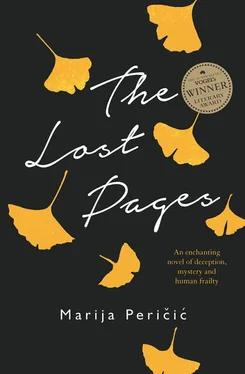As pleasant as my thoughts were, these actions were unlikely to have any effect. Franz, I mused, was a lawyer who worked for an insurance company. If anyone were likely to keep copies, an insurance lawyer was sure to. And where would those copies be? Would he go so far as to stow them away in a safe somewhere? I imagined myself creeping into his house or his office at night and rifling through the papers in his writing desk by torchlight. [12] The preceding three paragraphs were uncovered from beneath a scrap of lined paper, on which the following three paragraphs appear. The scrap has been fixed over the notebook paper with adhesive. The glue has partially dissolved the ink in some areas, and the meaning has been approximated from the context.
But it was useless. I knew that even if I did any of these things it was unlikely to make any difference. The best I could hope for was a short delay in having the thing brought out. Franz would have no difficulty in having the book published, with or without my help, and I had no doubt that it would be a success. It was a work of genius. I imagined my friends reading the novel and recognising me in Gregor. They would meet and excitedly discuss the novel, each wondering whether it would be indiscreet to speculate on whether Gregor had originated with me. They would slyly eye one another, gauging whether the others were thinking the same. After a while someone would hesitantly raise the subject.
‘Did the descriptions of Gregor’s… condition… remind you of anyone?’
The others would feign confusion for a moment and then someone else would offer timidly, ‘Well, you know, Max did come to mind.’ Then would follow a chorus of loud and eager sympathy to cover their greedy curiosity: ‘Poor Max, so brave, he manages very well I’ve always thought.’ And then: ‘Has he read it, do you think?’
And of course I would see my friends soon, I would encounter them at a party, or a café, or walking down the street, and they would be thinking all of these things and watching me for some reaction. I had to put a stop to it.
The manuscript was still lying in the corner where I had thrown it. I rolled out of bed and retrieved it. I took the papers to my writing table and smoothed them on the surface of the desk with my palms. The black ink burned against the white page. I saw my hands drift to the top of the pages, and it was like watching the hands of another person. The hands picked up the manuscript and tried to tear it, but it was too thick. I watched them tear off the first page, slowly, deliberately. Then they began to tear that page in half and then in half again and again. The paper hissed in protest, but it made no difference; soon all that remained were little flakes of white, speckled with black. They rained down all over the writing table and onto my lap and shoes. Once the hands had finished with the first page they began on the next, and the sound of all that paper tearing was more exquisite to my ears than the singing of angels.
AFTER DESTROYING THE MANUSCRIPT I FELT WONDERFUL, BETTER than I had felt for months, but this feeling did not last. I knew that my act of destruction was meaningless and by the next morning my depression had descended once more. A heavy fog had settled over my mind and, rather than being able to concentrate on the problem of Franz to try to solve it, I was totally incapable of any kind of productive thought. I was sluggish, stupid and wanted nothing but to sleep the day through in a room with heavy curtains drawn. But I had been at home now for some days and was due to return to the post office. I was reluctant to return, but once I had I was grateful for the rhythm of the familiar routine. I performed the necessary tasks of my day mechanically—I got up at the usual time, dressed, ate my usual meals and completed my work with ease—but all the while I felt nothing inside.
Days passed. It was as though I, the part of me that I called ‘I’, had become independent of my body, which carried on with my usual routine as if from some intelligence built into the bones and the muscles. My real self floated somewhere in the air around my body or had retreated to somewhere in its depths. I appeared to be normal; that is, no one seemed to notice any difference. People’s faces looked the same as they usually did when they greeted me, and no one started in surprise at the spectacle that I presented: of a man of animated flesh, of walking and talking muscles with no one at the helm. In my office at work I would sit very still and listen to my own breathing, breath after breath, in and out, as inexhaustible as the waves of the sea. Occasionally I took out the notes for my book and looked over them, but all I found there were some dead black marks on the dust-covered page, like hieroglyphics.
Thoughts of Anja pained me, though only in a theoretical way, and I avoided the streets close to her house and the grounds of the university, more from their association with my former bliss than the desire to avoid running into her. She came to call on me in any case a few weeks after I had returned to work. She arrived at the house shortly after I had come home from the post office, bringing with her a tray of biscuits from the Café Louvre. Her voice was kind and gentle, and I thought I could read regret in her eyes, but perhaps it was only sympathy.
Elsa made coffee and Anja and I sat in the living room and ate the biscuits. The anaesthetised feeling that I had maintained for days began to falter and images from Franz’s Gregor flashed into my mind at random, each bringing a stab of pain. I pictured Gregor as a monster with my face, wearing my clothes, and the whole story playing out in the rooms of this house, in my own bed, under this sofa.
I was besieged, too, with jealous thoughts about Franz. His straight body, his elegant features haunted me. How could she ever prefer me to him? The spectre of my ruined body returned to me and I viewed myself as if from the outside, a lumpish, repulsive figure slumped beside Anja’s delicate form, like a rude lump of clay beside a Meissen figurine. I strained to keep my body as upright as possible so that my hand shook as I lifted the little coffee cup to my lips.
Anja seemed to have noticed nothing amiss and carried on as if everything was as usual between us, as if the episode with the comb had not occurred. I felt grateful to her for this, and also for the sense of calm that she exuded. She leaned forward to take a wafer from the tray. The disturbance of the air wafted her perfume towards me and all the smells of summer came to me: plums and dusty grass heated by the sun. The smell unknotted something in me and my head was suddenly tight with tears. A great sadness unfolded itself over me: the sadness of regret, as though Anja had died, or I had, and there was no going back.
I wanted to tell her about Gregor, confide my fears. I wanted to ask her about Franz and have her laugh away the suggestion. I wanted to sink into the sofa cushions and cry and have her smooth away my pain with her white hands. But I did not know where to start the story. She knew me only as Max Brod, the successful writer. I had never spoken to her of any of my difficulties, either with writing or with my life in general. She knew nothing of my childhood, of my being a cripple. I had pretended to myself that she had not even noticed my deformity; a fantasy, of course, but it was also true that I had never seen her eyes fasten onto my body and slide down it the way the eyes of others did. While she had told me every tale of her own childhood and a thousand details of her experience, I had largely remained silent or else presented her with carefully curated scenes. To break down now and flood her with my misery would be to edge close to madness. I wondered if I could simply show her Franz’s manuscript, and whether she would then understand about Gregor. Would she? And would she then laugh the thing away? Or would she turn towards me with her eyes crumpled in concern? She had the power to allay my fears but also to give them life.
Читать дальше












